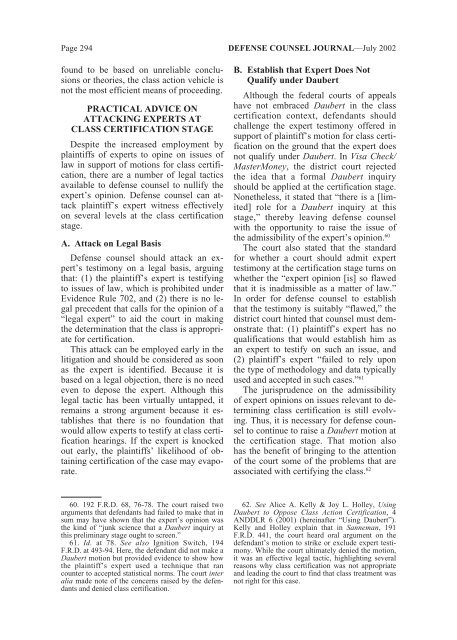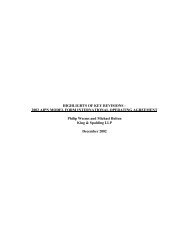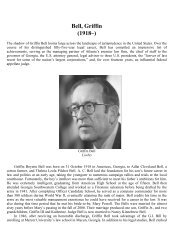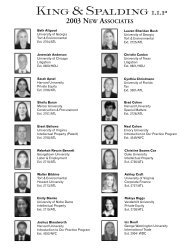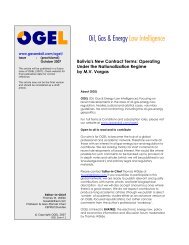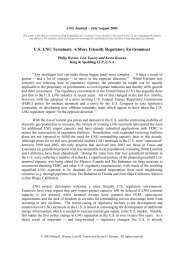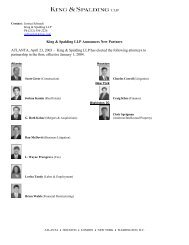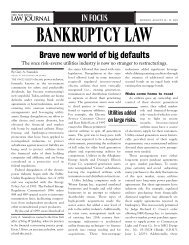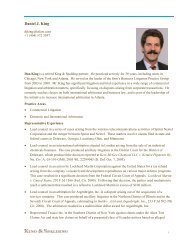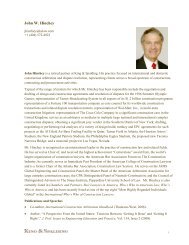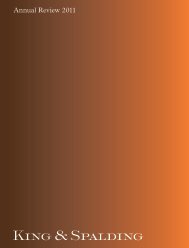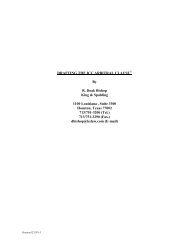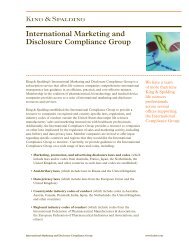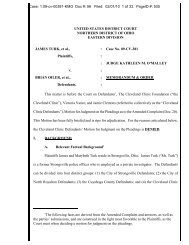Use and Misuse of Expert Opinions at the Class ... - King & Spalding
Use and Misuse of Expert Opinions at the Class ... - King & Spalding
Use and Misuse of Expert Opinions at the Class ... - King & Spalding
Create successful ePaper yourself
Turn your PDF publications into a flip-book with our unique Google optimized e-Paper software.
Page 294 DEFENSE COUNSEL JOURNAL—July 2002<br />
found to be based on unreliable conclusions<br />
or <strong>the</strong>ories, <strong>the</strong> class action vehicle is<br />
not <strong>the</strong> most efficient means <strong>of</strong> proceeding.<br />
PRACTICAL ADVICE ON<br />
ATTACKING EXPERTS AT<br />
CLASS CERTIFICATION STAGE<br />
Despite <strong>the</strong> increased employment by<br />
plaintiffs <strong>of</strong> experts to opine on issues <strong>of</strong><br />
law in support <strong>of</strong> motions for class certific<strong>at</strong>ion,<br />
<strong>the</strong>re are a number <strong>of</strong> legal tactics<br />
available to defense counsel to nullify <strong>the</strong><br />
expert’s opinion. Defense counsel can <strong>at</strong>tack<br />
plaintiff’s expert witness effectively<br />
on several levels <strong>at</strong> <strong>the</strong> class certific<strong>at</strong>ion<br />
stage.<br />
A. Attack on Legal Basis<br />
Defense counsel should <strong>at</strong>tack an expert’s<br />
testimony on a legal basis, arguing<br />
th<strong>at</strong>: (1) <strong>the</strong> plaintiff’s expert is testifying<br />
to issues <strong>of</strong> law, which is prohibited under<br />
Evidence Rule 702, <strong>and</strong> (2) <strong>the</strong>re is no legal<br />
precedent th<strong>at</strong> calls for <strong>the</strong> opinion <strong>of</strong> a<br />
“legal expert” to aid <strong>the</strong> court in making<br />
<strong>the</strong> determin<strong>at</strong>ion th<strong>at</strong> <strong>the</strong> class is appropri<strong>at</strong>e<br />
for certific<strong>at</strong>ion.<br />
This <strong>at</strong>tack can be employed early in <strong>the</strong><br />
litig<strong>at</strong>ion <strong>and</strong> should be considered as soon<br />
as <strong>the</strong> expert is identified. Because it is<br />
based on a legal objection, <strong>the</strong>re is no need<br />
even to depose <strong>the</strong> expert. Although this<br />
legal tactic has been virtually untapped, it<br />
remains a strong argument because it establishes<br />
th<strong>at</strong> <strong>the</strong>re is no found<strong>at</strong>ion th<strong>at</strong><br />
would allow experts to testify <strong>at</strong> class certific<strong>at</strong>ion<br />
hearings. If <strong>the</strong> expert is knocked<br />
out early, <strong>the</strong> plaintiffs’ likelihood <strong>of</strong> obtaining<br />
certific<strong>at</strong>ion <strong>of</strong> <strong>the</strong> case may evapor<strong>at</strong>e.<br />
B. Establish th<strong>at</strong> <strong>Expert</strong> Does Not<br />
Qualify under Daubert<br />
Although <strong>the</strong> federal courts <strong>of</strong> appeals<br />
have not embraced Daubert in <strong>the</strong> class<br />
certific<strong>at</strong>ion context, defendants should<br />
challenge <strong>the</strong> expert testimony <strong>of</strong>fered in<br />
support <strong>of</strong> plaintiff’s motion for class certific<strong>at</strong>ion<br />
on <strong>the</strong> ground th<strong>at</strong> <strong>the</strong> expert does<br />
not qualify under Daubert. In Visa Check/<br />
MasterMoney, <strong>the</strong> district court rejected<br />
<strong>the</strong> idea th<strong>at</strong> a formal Daubert inquiry<br />
should be applied <strong>at</strong> <strong>the</strong> certific<strong>at</strong>ion stage.<br />
None<strong>the</strong>less, it st<strong>at</strong>ed th<strong>at</strong> “<strong>the</strong>re is a [limited]<br />
role for a Daubert inquiry <strong>at</strong> this<br />
stage,” <strong>the</strong>reby leaving defense counsel<br />
with <strong>the</strong> opportunity to raise <strong>the</strong> issue <strong>of</strong><br />
<strong>the</strong> admissibility <strong>of</strong> <strong>the</strong> expert’s opinion. 60<br />
The court also st<strong>at</strong>ed th<strong>at</strong> <strong>the</strong> st<strong>and</strong>ard<br />
for whe<strong>the</strong>r a court should admit expert<br />
testimony <strong>at</strong> <strong>the</strong> certific<strong>at</strong>ion stage turns on<br />
whe<strong>the</strong>r <strong>the</strong> “expert opinion [is] so flawed<br />
th<strong>at</strong> it is inadmissible as a m<strong>at</strong>ter <strong>of</strong> law.”<br />
In order for defense counsel to establish<br />
th<strong>at</strong> <strong>the</strong> testimony is suitably “flawed,” <strong>the</strong><br />
district court hinted th<strong>at</strong> counsel must demonstr<strong>at</strong>e<br />
th<strong>at</strong>: (1) plaintiff’s expert has no<br />
qualific<strong>at</strong>ions th<strong>at</strong> would establish him as<br />
an expert to testify on such an issue, <strong>and</strong><br />
(2) plaintiff’s expert “failed to rely upon<br />
<strong>the</strong> type <strong>of</strong> methodology <strong>and</strong> d<strong>at</strong>a typically<br />
used <strong>and</strong> accepted in such cases.” 61<br />
The jurisprudence on <strong>the</strong> admissibility<br />
<strong>of</strong> expert opinions on issues relevant to determining<br />
class certific<strong>at</strong>ion is still evolving.<br />
Thus, it is necessary for defense counsel<br />
to continue to raise a Daubert motion <strong>at</strong><br />
<strong>the</strong> certific<strong>at</strong>ion stage. Th<strong>at</strong> motion also<br />
has <strong>the</strong> benefit <strong>of</strong> bringing to <strong>the</strong> <strong>at</strong>tention<br />
<strong>of</strong> <strong>the</strong> court some <strong>of</strong> <strong>the</strong> problems th<strong>at</strong> are<br />
associ<strong>at</strong>ed with certifying <strong>the</strong> class. 62<br />
60. 192 F.R.D. 68, 76-78. The court raised two<br />
arguments th<strong>at</strong> defendants had failed to make th<strong>at</strong> in<br />
sum may have shown th<strong>at</strong> <strong>the</strong> expert’s opinion was<br />
<strong>the</strong> kind <strong>of</strong> “junk science th<strong>at</strong> a Daubert inquiry <strong>at</strong><br />
this preliminary stage ought to screen.”<br />
61. Id. <strong>at</strong> 78. See also Ignition Switch, 194<br />
F.R.D. <strong>at</strong> 493-94. Here, <strong>the</strong> defendant did not make a<br />
Daubert motion but provided evidence to show how<br />
<strong>the</strong> plaintiff’s expert used a technique th<strong>at</strong> ran<br />
counter to accepted st<strong>at</strong>istical norms. The court inter<br />
alia made note <strong>of</strong> <strong>the</strong> concerns raised by <strong>the</strong> defendants<br />
<strong>and</strong> denied class certific<strong>at</strong>ion.<br />
62. See Alice A. Kelly & Joy L. Holley, Using<br />
Daubert to Oppose <strong>Class</strong> Action Certific<strong>at</strong>ion, 4<br />
ANDDLR 6 (2001) (hereinafter “Using Daubert”).<br />
Kelly <strong>and</strong> Holley explain th<strong>at</strong> in Sanneman, 191<br />
F.R.D. 441, <strong>the</strong> court heard oral argument on <strong>the</strong><br />
defendant’s motion to strike or exclude expert testimony.<br />
While <strong>the</strong> court ultim<strong>at</strong>ely denied <strong>the</strong> motion,<br />
it was an effective legal tactic, highlighting several<br />
reasons why class certific<strong>at</strong>ion was not appropri<strong>at</strong>e<br />
<strong>and</strong> leading <strong>the</strong> court to find th<strong>at</strong> class tre<strong>at</strong>ment was<br />
not right for this case.


